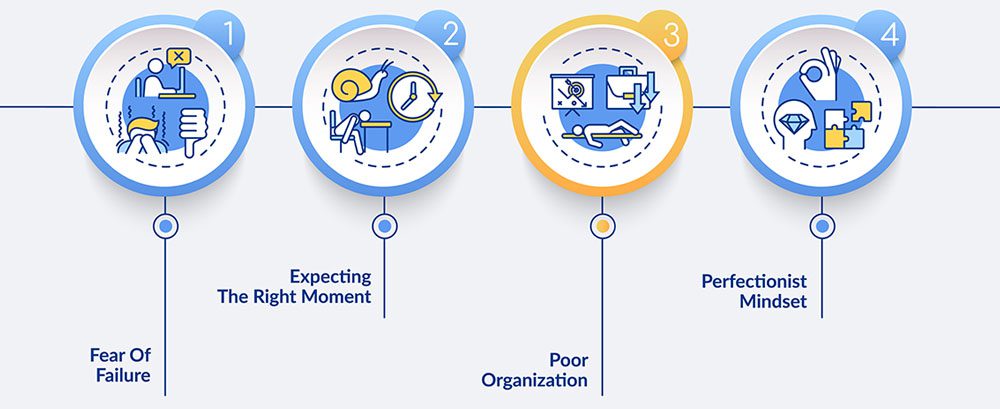Have you ever experienced the feeling of being stuck in an endless loop of perfectionism and procrastination? That nagging feeling that keeps you up at night, unsure of how to move forward? The truth is, getting out of the cycle of perfectionism and procrastination is difficult but not impossible.
In this article, we discuss how to stop the cycle of perfectionism and procrastination for good. We begin by understanding why it’s so hard to break out of this loop and what strategies can help you make a lasting change. We then explore several practical tools you can use to break away from this destructive pattern once and for all. By the end, you’ll have a better understanding of how to take control of your life and make real progress in achieving your goals.
“Procrastination is the thief of time, collar him.”
Charles Dickens
Perfectionism and procrastination are two sides of the same coin — one feeds off the other creating an unstoppable force that prevents us from making changes in our lives. But with determination and effort, we can figure out how to break free from this vicious cycle. So read on if you’re ready to take back control.
Why Perfectionism Leads To Procrastination
Perfectionism and procrastination are two traits that often go hand in hand. Perfectionists tend to feel overwhelmed by their tasks, leading to procrastination. On the other hand, procrastinators may find themselves trying to overcompensate for their inability to get started by striving for perfection. So why does perfectionism often lead to procrastination?
Perfectionism can be a double-edged sword—while it can drive people toward success, it can also lead them down a path of anxiety, stress, and ultimately procrastination. To understand why this happens, we must first recognize what perfectionism is. Perfectionism is defined as an irrational belief that everything you do must be perfect or else you are a failure.
When trying to juggle multiple commitments at once, perfectionists often become anxious because they end up focusing on every small detail of the task rather than being able to see the bigger picture and complete their work more efficiently. This fluctuation in focus from the big picture down to small details can cause them to become overwhelmed and take more time than necessary to finish a project – making them less productive overall. Additionally, because perfectionists become overly concerned with achieving “perfect” results all at once, any amount of failure or perceived imperfection becomes unbearable and leads them to avoid doing whatever task it was that triggered these feelings in the first place – thus leading them straight into the arms of procrastination.
Though it may not seem like it at first glance – many times bold action is needed to break out of this cycle. Once you realize why perfectionism is causing your procrastination – you can begin taking steps towards curbing those feelings and move forward with motivation instead of fear of failure holding you back! By setting realistic goals and expectations for yourself, breaking down larger tasks into smaller ones that are easier to accomplish incrementally and avoiding comparisons with others – you’ll be one step closer to breaking away from this harmful cycle for good.
The Perfectionism – Procrastination Loop
We all experience moments of perfectionism and procrastination from time to time, but for some individuals, these feelings can become cyclical. If left unchecked, perfectionism and procrastination can develop into a vicious cycle that leads to a lot of stress and unproductive behavior. In this article, we will explore the perfectionism-procrastination loop in detail – looking at your thoughts, feelings, and habits as driving forces, amplifiers and causes.
Your Thoughts
Our thoughts are powerful tools – they can make us feel empowered or overwhelmed depending on how we perceive them. For perfectionists, the thought process is usually less about making progress toward a goal and more about avoiding mistakes or failure. The fear of not being good enough or even average can be an obstacle to getting work done on time. To reduce the feeling of being overwhelmed by perfectionist thoughts, it helps to break down tasks into smaller pieces which are easier to accomplish incrementally instead of trying to get everything perfect all at once. Additionally, reframing negative thoughts into positive ones is a great way to change perspective and open up possibilities for meaningful action instead of paralysis due to fear of not reaching the desired perfect result.
Your Feelings
It’s impossible to ignore how our feelings influence how we behave in different situations. A common trait among perfectionists is that they feel uncomfortable whenever their work does not meet their own exacting standards – often leaving them feeling anxious or depressed when faced with tasks deemed too difficult or too complex for them to complete perfectly. This anxiety can lead to further procrastination as an attempt to avoid dealing with difficult emotions like shame or guilt associated with having imperfect results – creating a state where self-defeating behaviors like rumination take place over productivity instead.
Your Habits
Perfectionism tends to feed off our worst habits – whether it’s staying up late trying to finish something “perfect” or constantly comparing your progress with others around you in order to measure up. It’s important to recognize these habits as warning signs that your approach may need adjusting so that you don’t become stuck in an endless cycle of trying (and failing)to achieve perfection while simultaneously putting off real progress toward your goals due to procrastination. Making small changes such as getting better sleep, setting realistic deadlines and finding support from friends and family can help alleviate these bad habits by increasing motivation and reducing feelings of despair associated with striving for unattainable levels of excellence.
By understanding how our thoughts, feelings, and habits interact in creating this loop – you’re already one step closer to breaking free from this detrimental cycle. By following simple steps such as setting achievable goals within reasonable timelines – you can give yourself permission for shortfalls yet still end up achieving success when it comes to completing projects in a timely manner.

¿Quieres emprender un negocio paralelo, pero no sabes cómo empezar?
Aquí tiene 199 ideas de ajetreo lateral para empezar ahora mismo.
Impact of the Cycle of Perfectionism and Procrastination
The cycle of perfectionism and procrastination can have a profound effect on our physical and mental health. If left unchecked, this cycle can lead to reduced productivity, unhealthy habits, and even serious health problems. In this part we will explore the physical and mental health effects that can result from the perfectionism-procrastination loop in detail – while also providing helpful advice on how to break away from this harmful pattern.
Physical Health Effects
When perfectionists become overwhelmed by their work or circumstances resulting in procrastination – it can often lead to forming bad habits like unhealthy eating, lack of exercise, or staying up late trying to finish tasks at the last minute. Not getting enough sleep as well as too much stress are both known risk factors when it comes to weakened immunity and chronic illness. It’s important for people stuck in this loop to recognize these dangers early on and make changes such as reducing screen time before bed or practicing relaxation techniques in order to prevent further unnecessary strain on your body. Additionally, developing healthy habits such as proper nutrition, regular exercise and studying/working in reasonable chunks of time instead of all at once will help reduce stress levels significantly.
Mental Health Effects
In addition to affecting our physical well-being – the perfectionism-procrastination loop can also have grave effects on our mental health as well. Perfectionists tend to view mistakes or imperfections as personal failures – leading them towards feelings of anxiety or depression caused by fear of judgment or fear of not meeting expectations. This can be especially tough if they are comparing themselves with others instead of focusing on reaching their own goals – creating an unproductive state where self-doubt takes precedence over real progress being made! To counter these negative emotions – take some time each day for yourself and focus on activities that bring you inner joy such as meditation, journaling, spending quality time with friends or family, etc – doing something that is just for you is key to preventing feelings overwhelm from taking hold.
We may feel powerless over these feelings sometimes but there are practical steps we can take today toward breaking away from the destructive cycle of perfectionism and procrastination for good! Learning how to break tasks into smaller chunks rather than trying to do everything perfectly at once – setting realistic deadlines for yourself so there is less pressure when it comes to getting things done – and lastly finding meaningful support systems like family members/friends or online communities who will provide advice – all play a role in helping us reach our goals without letting fear become an obstacle towards success.

Other Causes Of Procrastination
Procrastination is an all too common problem – and while it can be attributed to perfectionism, there are many other causes that can cause us to put off tasks or avoid working on them entirely. Here are some of the most common causes of procrastination besides perfectionism:
ADHD
Attention Deficit Hyperactivity Disorder – also known as ADHD – is one of the leading reasons why people procrastinate. People with ADHD tend to become easily distracted, have difficulty focusing, or lose interest in tasks after starting them, resulting in much lower productivity than their peers. While medication is available to help regulate hyperactivity and increase focus – behavior therapy is often prescribed alongside medication as a way to help manage symptoms such as impulsivity or procrastination. Cognitive behavioral therapy (CBT) is particularly effective for managing these symptoms as it helps individuals learn how to establish a routine for working on tasks and build up the skills needed for focusing and completing projects on time.
Stress & Anxiety
Stress and anxiety are two powerful emotions that can lead us into procrastinating due to fear of failure or fear of not being good enough – creating feelings of dread when faced with difficult decisions/tasks. People dealing with high levels of stress and anxiety tend to perceive challenging tasks as overwhelming assets instead of achievable goals which then further increases the risk of putting off work until later! To reduce stress-related procrastination – it’s important to challenge negative thoughts by reframing them into positive ones and taking frequent breaks throughout your day so you don’t become overwhelmed or discouraged by having too much work piling up at once. Additionally practicing deep breathing exercises before facing complex/challenging tasks can be incredibly helpful in reducing stress-related procrastination in the long run.
Plain Old Laziness
Sometimes our motivation just isn’t there when it comes to getting things done – whether it’s because we’re feeling uninspired by our current circumstance/job or simply lack direction about what needs to be done next. This type of lazing around can quickly turn into chronic procrastination if left unchecked – making it essential for people facing this issue to develop realistic goals within reasonable timelines that are achievable when consistently worked towards! Additionally, rewarding yourself after achieving small successes along the way (like taking a walk during break time or buying yourself something nice after finishing a particularly tricky task) helps create better habits over time.
Paralysis By Overwhelm
Perfectionism can paralyze us all when we're trying to do too much at once, without the resources or expectations that make it achievable. This feeling of overwhelm is important to identify early so appropriate steps may be taken before these constricting thoughts take a toll on our mental health and ultimately lead us into depression. Splitting tasks into smaller achievable chunks, even if they aren't ideal yet, allows us to be open-minded and take risks in decision-making rather than staying away from any input due to potential issues. This gives us the freedom to experiment without a fear of failure.
Unclear Goals
When presented with a task or project, having a clear idea of what is expected from us and when it needs to be completed can make all the difference when it comes to pushing through the inevitable moments of hesitation or fear. Without these boundaries in place, it can be easy for people to slip into procrastination mode as they try and figure out what exactly needs doing and why – creating an illusion of being productive yet failing to make any meaningful progress due to a lack of planning and direction. To tackle such unclear goals, break down tasks into smaller chunks or “micro-goals” which allow you to track your progress along the way while also giving yourself mini milestones that don’t require complete perfection at once.
Technology over Dependence
With technology becoming increasingly accessible and convenient these days, many have come to rely too heavily on digital distractions such as phones, tablets or computers for entertainment purposes – using them as psychological buffer zones against dealing with difficult tasks instead. Unfortunately, this over-reliance on technology for diversion often results in wasted hours which could have been put towards making real progress if not spent scrolling aimlessly through social media feeds or watching videos online! Staying mindful about how/where you spend your time sometimes means setting aside devices and learning how to focus on important matters before they become too daunting – recognizing that sometimes taking a step back from digital comfort zones is key to finding true purpose within our daily grinds rather than relying on temporary escapism provided by technology itself.
Thought Processes / Overthinking
Certain thought patterns such as catastrophizing worst-case scenarios or focusing exclusively on negative aspects of a task can lead us towards procrastinating even before we've started working on it. We may also start feeling overwhelmed if the perceived difficulty or complexity of a task greatly exceeds our self-perceived capabilities (which often leads to an increased sense of dread). To counter these unhelpful thought processes, it may help to replace them with positive affirmations and realistic goal setting – breaking down large projects into smaller chunks that can be accomplished incrementally instead of trying to get everything perfect all at once. Additionally, reframing negative thoughts into positive ones not only has a calming effect but also opens up possibilities for meaningful action instead of paralysis due to fear.
Environmental Pressures
It’s a well-known fact that our environment plays a key role in how we react and behave – so it shouldn’t be surprising that external pressures like deadlines or group activities can often lead us towards procrastinating in order to avoid feeling overwhelmed or unprepared. To counter this, try breaking down larger tasks into smaller chunks and setting reasonable timelines for yourself so you don’t feel rushed when working on projects. Remind yourself that it’s okay to make mistakes, celebrate small victories regularly, and if possible – find someone who will hold you accountable for your progress which will help reduce feelings of guilt associated with taking too long on completing something.
Skill Deficits
While sometimes not directly related to perfectionism or environmental pressure – lacking important skills necessary for success such as time management or analytical thinking can also lead us towards prolonged periods of procrastination. It helps here to identify where these skill deficits lie so they can be addressed via proper training programs (or even self-teaching!) rather than avoiding the task altogether in fear of failing. It may also be helpful here to have someone who offers unbiased feedback regarding progress – enabling you to stay focused by measuring progress against set milestones instead of obsessing over every tiny detail along the way.
You see, procrastination has many reasons, causes and faces. These are just the most common ones. Being mindful of these can help us identify the moments when we are being unproductive instead of productive so that we can learn to break out of the habit and become more productive in the long run.
The Different Types Of Procrastinators
Procrastinators usually come in one of 4 different types of personalities. Sometimes, there are wild mixes of two or more types, so don't take this list as gospel.
Procrastination is a direct effect of your intrinsic motivation.
Find your “WHY” and fight it!
Type 1: The Perfectionist
The Perfectionist is perhaps the most common type of procrastinator. They set very high standards for themselves and strive to achieve perfection in everything they do. This can lead to extreme anxiety and an inability to move forward with their work, as they are never quite satisfied with the end result.
Type 2: The Overwhelmed
The Overwhelmed procrastinator is one who feels overwhelmed by the amount of tasks that need to be completed. This often leads them to feel anxious and anxiousness can cause them to become paralyzed, unable to take action on any task whatsoever.
Type 3: The Avoidance based Procrastinator
This type of procrastinator is someone who tends to avoid certain tasks because they are difficult or uncomfortable. For some people, this could be responding to emails or calling somebody they don’t know well. Others may simply avoid starting a project altogether due to fear of failure or embarrassment.
Type 4: The Busybody
The Busybody procrastinator is someone who is constantly busy, but not necessarily productive. They may fill their day with small, menial tasks and avoid tackling bigger projects altogether or wait until the last minute when it becomes an emergency situation before taking action on it.
No matter what type of procrastinator you are, there are ways you can combat your tendencies and develop better habits so you can become more productive and successful over time.
Strategies for Breaking the Cycle of Perfectionism and Procrastination
Perfectionism and procrastination can be difficult to break out of, but it's not impossible. Here are 7 strategies that come in handy:
Lowering the Bar
One of the most important aspects to consider in breaking the cycle of perfectionism is lowering your expectations. This doesn’t mean accepting substandard results; rather it means being more realistic about what you expect from yourself and managing those expectations. If you’re too hard on yourself, you’ll spend an inordinate amount of time obsessing over small details instead of completing tasks. As a result, projects take longer than they need to, setting off a chain reaction that leads to procrastination. Setting realistic goals and allowing yourself some wiggle room for mistakes or difficulties will help reduce perfectionist tendencies.
Bite-Sized Tasks
Another strategy for overcoming perfectionism is to break larger tasks down into smaller ones that are more manageable. This makes the task less daunting, freeing up mental space so that you don’t become overwhelmed by how much needs to get done. It also gives you milestones along the way that you can use as rewards for yourself as motivation. For example, if a project requires extensive research or steps with multiple components, break it down into smaller chunks like finding relevant sources or writing individual sections at a time before putting them all together into one finished piece. Doing things this way will help keep anxiety at bay while building confidence as successes are achieved along the way.
Time Tracking
Time tracking is another effective tool when trying to get past procrastination because it provides clarity and reinforces discipline in your workflow. Having time limits set beforehand on each step prevents distractions from delaying progress unnecessarily; this also gives you tangible evidence when reflecting on whether certain tweaks were necessary or simply wasted precious minutes or hours without benefiting your work in any meaningful way. Seeing where your day went can lead to greater awareness about how best to optimize future efforts for maximum productivity with minimum lost time due to disruption caused by perfectionist tendencies.
Positive Support And Thinking
Positive support plays an important role in overcoming your procrastination because it helps instill confidence throughout every step of the process instead of dreading every action taken out of fear of making mistakes or falling short on expectations placed upon oneself by an inner critic that’s constantly jumping ahead many steps ahead at once. Having someone who encourages taking risks while reassuring that mistakes aren’t life-ending events can do wonders in tackling perfection-driven procrastination issues head-on and provide a sense of safety during times when doubts start creeping in about what may or may not happen if certain paths are taken versus others left unexplored due to fear overriding logic.
Reward Yourself
Rewards are key components when trying to get past any type of obstacle—especially psychological ones — so give yourself something after achieving each milestone or reaching goals set forth earlier (for instance buying something nice for yourself). Rewards aren't necessary material items; just taking some time away from work after meeting deadlines or accomplishing other achievements helps psychologically recharge so that focus returns refreshed rather than exhausted which improves overall productivity levels afterward due to their collective usefulness combined with newfound efficiency due to eliminating wasted energy expended on worrying about failure instead of actually doing something productive towards achieving success.
Delegating Or Avoiding Unproductive Stuff
Achieving exactness and correctness may seem to be at odds with offloading the less desirable tasks, yet it can often make perfect sense. Although relinquishing control makes it more difficult (if not impossible) to ensure the accuracy of results, proper delegation will still guarantee precision in outcomes.
By letting someone else take care of ordinary tasks not directly linked to your primary goals, you can devote more time to refining existing assets instead of immediately rushing into creating new ones. With no energy wasted in the process, you will find yourself with a surplus of energy afterward, giving you long-term benefits like decreased stress levels and increased cumulative efficiency compared to earlier tactics.
Practicing Meditation And Mindfulness
By taking time to meditate and practice mindfulness, it's possible to break free from the vicious cycle of perfectionism and procrastination. Through meditation, we can clear our minds of any detrimental self-talk that leads to procrastinating; quelling fear, anxiety and worry in the process.
Mindfulness practices can aid in your ability to concentrate on the present instead of fretting about future events. Additionally, it allows you to regulate emotions more effectively by becoming aware and embracing your thoughts and feelings rather than attempting to push them aside or ignore them.
By using these techniques, you can create a haven of peace away from the anxieties and self-judgment associated with perfectionism. This will enable you to make more reasonable choices when confronted with temptation such as spending too much time on insignificant tasks that don't actually contribute towards achieving the desired outcome or result.
Start small and grow your habit over time as you become familiar with it, eventually turning it into a part of your daily life. This can look like beginning with just a few minutes each day and slowly expanding the amount until it is second nature – this way, you will be able to demolish any mental barriers caused by perfectionist attitudes that would have otherwise limited success. By practicing consistently, remarkable progress awaits.
Algunas palabras finales
Breaking out of the cycle of perfectionism and procrastination requires self-reflection and personal accountability but it's possible if you take the necessary steps outlined above toward building your own tailored strategy.
The intention of this article is to make you feel aware of your situation and to tell you that you're not alone.
Don't feel guilty, ashamed or embarrassed if you feel overwhelmed with your tasks or if you can't get a project to start. Take your time, plan your steps and then take massive action.
There is no need for perfection in many many cases. All it needs is a start. Yes, just start, learn along the way and make adjustments. Honestly, that's all it takes.
Take a deep breath, remember your goal and move forward. You can do it!

















